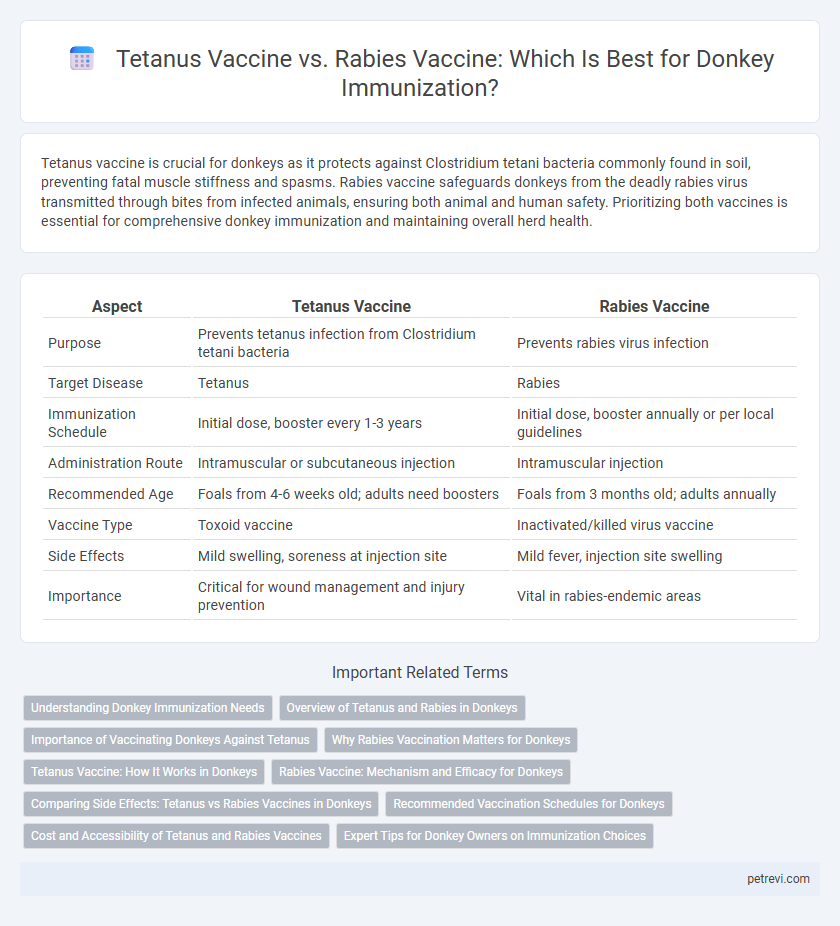Tetanus vaccine is crucial for donkeys as it protects against Clostridium tetani bacteria commonly found in soil, preventing fatal muscle stiffness and spasms. Rabies vaccine safeguards donkeys from the deadly rabies virus transmitted through bites from infected animals, ensuring both animal and human safety. Prioritizing both vaccines is essential for comprehensive donkey immunization and maintaining overall herd health.
Table of Comparison
| Aspect | Tetanus Vaccine | Rabies Vaccine |
|---|---|---|
| Purpose | Prevents tetanus infection from Clostridium tetani bacteria | Prevents rabies virus infection |
| Target Disease | Tetanus | Rabies |
| Immunization Schedule | Initial dose, booster every 1-3 years | Initial dose, booster annually or per local guidelines |
| Administration Route | Intramuscular or subcutaneous injection | Intramuscular injection |
| Recommended Age | Foals from 4-6 weeks old; adults need boosters | Foals from 3 months old; adults annually |
| Vaccine Type | Toxoid vaccine | Inactivated/killed virus vaccine |
| Side Effects | Mild swelling, soreness at injection site | Mild fever, injection site swelling |
| Importance | Critical for wound management and injury prevention | Vital in rabies-endemic areas |
Understanding Donkey Immunization Needs
Donkeys require specific immunization protocols due to their unique physiology and susceptibility to certain diseases. The tetanus vaccine is crucial for donkeys to prevent Clostridium tetani infection, which can enter through wounds and cause severe muscle stiffness and spasms. While the rabies vaccine is essential in regions where rabies is prevalent, tetanus vaccination remains a priority because tetanus spores are commonly found in the environment and pose a high risk to donkeys.
Overview of Tetanus and Rabies in Donkeys
Tetanus in donkeys is caused by Clostridium tetani bacteria, leading to muscle stiffness and spasms, often resulting from wounds or injuries. Rabies, a viral zoonotic disease, affects the nervous system and is typically transmitted through bites from infected animals, posing a fatal threat to donkeys without timely vaccination. Effective immunization protocols require the use of tetanus and rabies vaccines to prevent these potentially deadly infections in donkey populations.
Importance of Vaccinating Donkeys Against Tetanus
Vaccinating donkeys against tetanus is crucial due to their high susceptibility to Clostridium tetani bacteria found in soil and wounds, which can lead to fatal paralysis. The tetanus vaccine provides essential immunity by stimulating antibody production that neutralizes the toxin, preventing the onset of the severe neurological disease. Unlike the rabies vaccine, which protects against a viral infection, the tetanus vaccine specifically addresses the common and potentially deadly risk of wound contamination in donkeys.
Why Rabies Vaccination Matters for Donkeys
Rabies vaccination is crucial for donkey immunization because donkeys are vulnerable to rabies virus transmission through bites from infected animals, posing a significant zoonotic risk. Unlike tetanus vaccination, which protects against Clostridium tetani infection primarily through wound contamination, rabies vaccination prevents fatal neurological disease that affects both animals and humans. Ensuring donkeys receive rabies vaccines contributes to preventing outbreaks, protecting public health, and maintaining equine herd immunity.
Tetanus Vaccine: How It Works in Donkeys
Tetanus vaccine in donkeys stimulates the immune system to produce antibodies against Clostridium tetani toxin, preventing the onset of tetanus disease. It is typically administered as an intramuscular injection, with booster shots recommended every 1 to 3 years depending on exposure risk and local veterinary guidelines. Effective immunization significantly reduces mortality caused by muscle stiffness and spasms associated with tetanus in donkeys.
Rabies Vaccine: Mechanism and Efficacy for Donkeys
The rabies vaccine for donkeys works by stimulating the animal's immune system to produce neutralizing antibodies against the rabies virus, providing active immunity that prevents viral replication and neurological damage. Clinical studies demonstrate that in donkeys, the rabies vaccine achieves high seroconversion rates and long-lasting protection, typically requiring annual booster shots to maintain efficacy. Compared to the tetanus vaccine, which targets a bacterial neurotoxin, the rabies vaccine specifically combats a viral pathogen, making it essential for preventing fatal encephalitis in donkeys exposed to rabid animals.
Comparing Side Effects: Tetanus vs Rabies Vaccines in Donkeys
Tetanus vaccines in donkeys generally cause mild local swelling and transient soreness at the injection site, with rare systemic reactions, whereas rabies vaccines may induce more pronounced local inflammation and occasional mild fever. Both vaccines are crucial for preventing fatal diseases, but monitoring for adverse effects post-vaccination is essential to ensure animal well-being. Side effects for tetanus vaccines tend to be less frequent and milder compared to rabies vaccines in donkey immunization protocols.
Recommended Vaccination Schedules for Donkeys
Donkeys require distinct vaccination schedules for tetanus and rabies to ensure effective immunization against these diseases. The tetanus vaccine is typically administered initially at 4-6 weeks of age, followed by a booster at 4-6 weeks later, and then annually; in contrast, the rabies vaccine is generally given yearly starting at 3-6 months of age, depending on local regulations and risk exposure. Maintaining an updated vaccination record aligned with veterinary guidelines is crucial to protect donkeys from tetanus and rabies infections.
Cost and Accessibility of Tetanus and Rabies Vaccines
Tetanus vaccines for donkeys are generally more affordable and widely accessible compared to rabies vaccines, making tetanus immunization a cost-effective choice in many regions. While rabies vaccines are essential for preventing fatal infections, their higher price and limited availability in rural or low-resource areas can restrict widespread use. Prioritizing tetanus vaccination enhances basic disease protection in donkeys, especially where veterinary services and cold chain facilities for rabies vaccines are less established.
Expert Tips for Donkey Owners on Immunization Choices
Tetanus and rabies vaccines are essential for donkey immunization, with tetanus vaccine protecting against Clostridium tetani spores common in soil and rabies vaccine guarding against the fatal rabies virus transmitted by wild animals. Donkey owners should prioritize annual tetanus boosters and rabies vaccinations based on regional rabies risks and veterinary recommendations. Expert tips emphasize maintaining a vaccination schedule, ensuring proper storage and handling of vaccines, and consulting veterinarians for tailored immunization plans to safeguard donkey health.
Tetanus Vaccine vs Rabies Vaccine for Donkey Immunization Infographic

 petrevi.com
petrevi.com